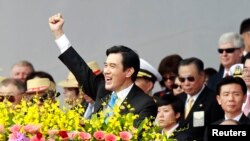TAIPEI —
Taiwan’s president said on Friday that for political talks to take place between the island nation and its old enemy, China, the government must wait for a stronger mandate. President Ma Ying-jeou’s cautious stance follows a recent push by China to discuss sensitive issues with an aim toward eventually reunifying the two sides. China and Taiwan have been separately ruled since 1949, when the leadership of the Kuomintang fled as the Communists emerged victorious from the Chinese civil war.
Chinese President Xi Jinping told a Taiwanese delegation at a regional economic meeting last month that the two sides must someday discuss political disputes and not continue to pass them from generation to generation.
Analysts saw Beijing’s statement as putting pressure on Taiwan to move toward unification with China after more than five years of trade and investment deals that have helped the island’s economy.
President Ma told a news conference for foreign journalists Friday that any political talks must be useful to Taiwan, but that a peace accord can wait.
Ma said that Taiwan is not ruling out political dialogue with China, but that any dialogue must be advantageous; Ma also added that he does not see the present as a proper time. He thinks it more helpful to Taiwan’s situation today to go step by step.
China has always considered Taiwan a part of its territory, and has threatened to attack Taiwan if peaceful reunification fails.
Ma eased hostilities after taking office in 2008 by agreeing to the first-ever talks between Taiwan and China, on economic issues. That dialogue has led to 19 agreements and a new sense of trust between the two sides. China hopes the agreements clear the way to an eventual reunification.
Taiwan's president conceded on Friday that the two sides could talk about a political issue if the two sides consider it singularly urgent. The two sides are now talking about the establishment of de facto consulates, he added, and although the content is neutral, the deal itself has a high level of political sensitivity. Ma clarified that his stance is to judge an issue’s urgency and the degree to which it impacts people’s interests.
The two sides have never established formal diplomatic contact, leading Taipei in April to push for first-ever representative offices that would handle the massive flow of new business and tourism resulting from other deals. Ma said trade talks are also still on the table, but that a peace accord would need to pass a voter referendum before negotiations could begin.
Some experts fear China will back away from signing more agreements that bind Taiwan to its massive economy if the island puts off political issues, but President Ma's approval ratings are hovering around 20 percent; some Taiwanese fault him for getting too close already to its communist neighbor.
Chinese President Xi Jinping told a Taiwanese delegation at a regional economic meeting last month that the two sides must someday discuss political disputes and not continue to pass them from generation to generation.
Analysts saw Beijing’s statement as putting pressure on Taiwan to move toward unification with China after more than five years of trade and investment deals that have helped the island’s economy.
President Ma told a news conference for foreign journalists Friday that any political talks must be useful to Taiwan, but that a peace accord can wait.
Ma said that Taiwan is not ruling out political dialogue with China, but that any dialogue must be advantageous; Ma also added that he does not see the present as a proper time. He thinks it more helpful to Taiwan’s situation today to go step by step.
China has always considered Taiwan a part of its territory, and has threatened to attack Taiwan if peaceful reunification fails.
Ma eased hostilities after taking office in 2008 by agreeing to the first-ever talks between Taiwan and China, on economic issues. That dialogue has led to 19 agreements and a new sense of trust between the two sides. China hopes the agreements clear the way to an eventual reunification.
Taiwan's president conceded on Friday that the two sides could talk about a political issue if the two sides consider it singularly urgent. The two sides are now talking about the establishment of de facto consulates, he added, and although the content is neutral, the deal itself has a high level of political sensitivity. Ma clarified that his stance is to judge an issue’s urgency and the degree to which it impacts people’s interests.
The two sides have never established formal diplomatic contact, leading Taipei in April to push for first-ever representative offices that would handle the massive flow of new business and tourism resulting from other deals. Ma said trade talks are also still on the table, but that a peace accord would need to pass a voter referendum before negotiations could begin.
Some experts fear China will back away from signing more agreements that bind Taiwan to its massive economy if the island puts off political issues, but President Ma's approval ratings are hovering around 20 percent; some Taiwanese fault him for getting too close already to its communist neighbor.




